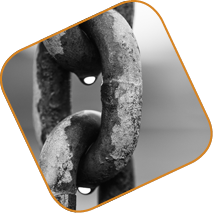5(A). Family support and harm
People are quiet about sexual abuse. Sometimes the abuse is out of ignorance and relatives are overwhelmed.
Family members are typically the primary carers for people with mental health issues in Zambia. The person with a mental health issue and a relative are often both out of work, meaning the financial burden for families can be significant.59 Mental health services are limited to seven cities around the country. These are seriously under-resourced and inaccessible for the vast majority of the population. Families are frequently left struggling without any support.
 Photo: Shutterstock
Photo: Shutterstock
Family members sometimes tie or chain people with mental health issues during a mental health crisis.60 The family typically sees this as a pragmatic solution to contain a person for their own welfare and for that of people around them. Most traditional healers interviewed said that people with mental health issues were brought to them chained or tied by relatives. The same happens in psychiatric hospitals too. A young woman in a psychiatric ward commented:
I was tied to bring me here. I was bruised – on my wrists and, see, my ankles still have a sore. Before when I’ve been too weak to make a decision my brother has taken me to a traditional healer in a wheelbarrow. But I was tied to come here.
Many people said that chaining and tying was a necessity because there was no alternative. Family members spoke of the huge cost to get to distant psychiatric hospitals which meant that they were unlikely to seek help early or be able to move a distressed person.
 Photo: Shutterstock
Photo: Shutterstock
Patients and nurses in psychiatric facilities emphasised both the pressure on families and the abuse that arises as a result of this. A nurse in Chainama Hills Hospital said:
Most patients have been physically and/or sexually abused at home. Physical abuse is most common. Sometimes it’s very obvious with bruising. People are quiet about sexual abuse. Sometimes the abuse is out of ignorance and relatives are overwhelmed.
This was similar to the experience of a clinical officer in a psychiatric ward outside Lusaka:
The relatives usually beat them, not necessarily in self-defence. It’s quite common for relatives to hit a patient, bring them here, then the patient goes home and they are beaten again.
A 40-year old spouse of a woman with mental health issues explained:
[My spouse] used to be chained when she was at [her parents’ home] by her relatives. Whenever she ran from home and attempted to take her clothes off, they would get hold of her and chain her […] They used strings made from tree barks […] her hands were chained to something stationary so that she couldn’t move away. […] One of her relatives would beat her sometimes because, when she was taken ill, she would take her clothes off.
 Photo: Shutterstock
Photo: Shutterstock

